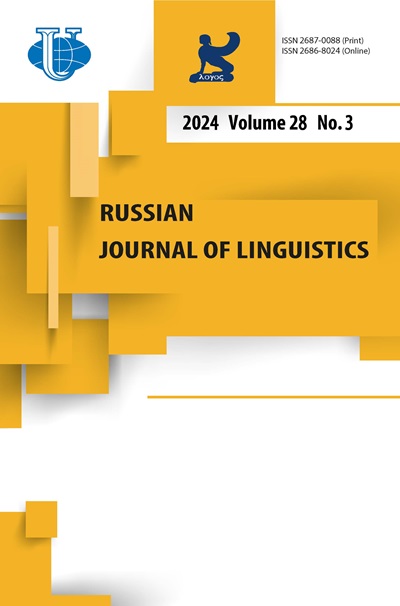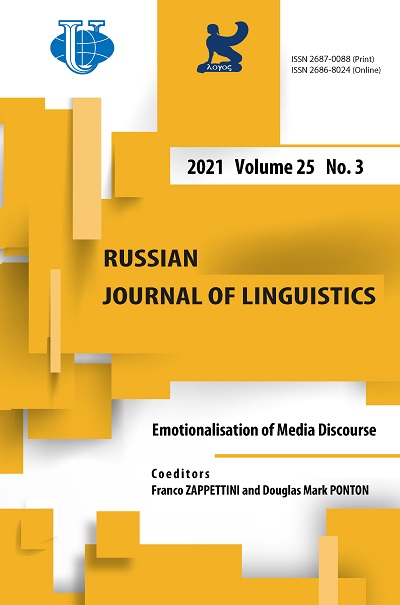Великобритания как жертва и герой в освещении Брексита газетой “Sun”
- Авторы: Заппеттини Ф.1
-
Учреждения:
- Ливерпульский университет
- Выпуск: Том 25, № 3 (2021): Emotionalisation of Media Discourse
- Страницы: 645-662
- Раздел: Статьи
- URL: https://journals.rudn.ru/linguistics/article/view/27477
- DOI: https://doi.org/10.22363/2687-0088-2021-25-3-645-662
Цитировать
Полный текст
Аннотация
Статья посвящена роли эмоций в дискурсивных стратегиях убеждения. В ней рассматривается, как во время публичных дебатов по вопросу Брексита британская таблоидная пресса использовала эмоции для продвижения данной идеи. На примере освещения газетой “Sun” «унижения» Великобритании на переговорах по Брекситу в Зальцбурге (2018) исследуется, как и с помощью каких языковых средств были дискурсивно оформлены акторы и описываемые события. Полученные данные свидетельствуют о том, что газета “Sun” вызывала у читателей эмоции страха и разочарования наряду с чувством гордости и свободы, чтобы связать Брексит с давно устоявшимся нарративом доминирования и национального героизма. Дискурс также подкреплялся дискурсивной просодией в сочетании с сатирическим жанром и популистским регистром, которые часто характеризуют британскую бульварную прессу. В частности, лингвистический анализ показал, как антагонистические образы Великобритании и ЕС подкреплялись аллегорией «некомпетентного» гангстеризма и морально оправданным сопротивлением. Таким образом, эмоционализация была нацелена как на высмеивание ЕС, так и на изображение ЕС как преступной организации, что сыграло важную роль в продвижении идеи Брексита среди читателей таблоида, а также легитимации и институционализации его более жестких форм. Рассматривая журналистский дискурс с учетом эмоционального, стилистического и политического аспектов коммуникации, данное исследование расширяет представление об использовании эмоциональных аргументов и популистских нарративов, а также подчеркивает роль бульварной журналистики в представлении политических отношений между Великобританией и ЕС.
Об авторах
Франко Заппеттини
Ливерпульский университет
Автор, ответственный за переписку.
Email: franco.zappettini@liverpool.ac.uk
ORCID iD: 0000-0001-7049-4454
имеет степень доктора, преподает в Ливерпульском университете, Великобритания, руководит аспирантскими программами в области коммуникации и СМИ. Его исследования сосредоточены на текстуальном/дискурсивном анализе различных форм политической коммуникации, включая опосредованные формы популизма, такие как таблоидный популизм и евроскептицизм в британской прессе. Он публикует свои исследования в рецензируемых международных журналах и монографиях. Его последняя публикация - монография Brexit: A Critical Discursive Analysis (PalgraveMacMillan).
Ливерпуль, ВеликобританияСписок литературы
- Alba-Juez Laura & Tatiana Larina. 2018. Language and Emotion: Discourse-Pragmatic Perspectives. Russian Journal of Linguistics 22 (1). 9-37.
- Anderson, Benedict. 2006. Imagined Communities: Reflections on the Origin and Spread of Nationalism. New York, Verso.
- Barnett, Anthony. 2018. Lure of Greatness. Penguin Random House.
- Bednarek, Monika & Helen Caple. 2014. Why Do News Values Matter? Towards a New Methodological Framework for Analysing News Discourse in Critical Discourse Analysis and Beyond. Discourse & Society 25 (2). 135-58
- Bell, Alan. 1996. The language of news media. Oxford: Blackwell.
- Bennett, Samuel. 2019. Present tense, future (im)perfect: ‘Brexit’ as a crisis issue in UK political discourse. Critical Discourse Studies 16 (4).
- Billig, Michael. 1995. Banal Nationalism. London, Sage Publications.
- Bingham, Adrian & Martin Conboy. 2015. Tabloid Century: The Popular Press in Britain, 1896 to the present. Oxford, Peter Lang.
- Brusenbauch Meislova, Monika. 2019. Brexit Means Brexit-or Does It? The Legacy of Theresa May's Discursive Treatment of Brexit. The Political Quarterly 90. 681-689.
- Buckledee, Steve. 2018. The language of Brexit: How Britain talked its way out of the European Union. London: Bloomsbury Academic.
- Charteris-Black, Jonathan. 2019. Metaphors of Brexit: No Cherries on the Cake? Basingstoke: Palgrave Macmillan.
- Cohen, Nick. 2019. One thing now unites Britons - a sense of national humiliation. Published in The Guardian (online). https://www.theguardian.com/commentisfree/2019/mar/23/one-thing-now-unites-britons-a-sense-of-national-humiliation-brexit (Accessed: 14.01.2021).
- Conboy, Martin. 2004. Language and the British tabloid press. In J. Aitchison and D. Lewis (eds.) New Media Language. Routledge.
- Daddow, Oliver. 2012. The UK media and ‘Europe’: from permissive consensus to destructive dissent. International Affairs 88 (6). 1219-1236.
- Dancygier, Barbara. 2021. Narrativized simile and emotional responses to Brexit. Russian Journal of Linguistics 25 (3). 663-684. https://doi.org/10.22363/2687-0088-2021-25-3-663-684
- Dobrosklonskaya, Tatiana G. 2021. Markers of emotionality in Russian news coverage of the 75-рth anniversary of the WWII Victory. Russian Journal of Linguistics 25 (3). 705-722. https://doi.org/10.22363/2687-0088-2021-25-3-705-722
- Entman, Robert M. 1993. Framing: Toward clarification of a fractured paradigm. Journal of Communication 43 (4). 51-58.
- Fairclough, Norman & Ruth Wodak. 1997. Critical Discourse Analysis. In T. van Dijk (ed.), Discourse Studies: A Multidisciplinary Introduction 2. 258-284. London: Sage.
- Foolen, Ad. 2012. The relevance of emotion for language and linguistics. In Foolen, A.P., Lüdtke, U.M., Racine, T.P., Zlatev, J. The relevance of emotion for language and linguistics. Amsterdam: John Benjamins.
- Goffman, Erving. 1981. Forms of Talk. Philadelphia: University of Pennsylvania Press.
- Hameleers, Michael, Linda Bos & Claes H. de Vreese. 2016. “They did it”: The effects of emotionalized blame attribution in populist communication. Communication Research 44(6). 870-900
- Hardt-Mautner Gerlinde. 1995. `How does One Become a Good European?’: The British Press and European Integration. Discourse & Society 6 (2). 177-205.
- Hilton, Anthony. 2016. Anthony Hilton: Stay or go - the lack of solid facts means it’s all a leap of faith. Published in The Evening Standard (online). https://www.standard.co.uk/comment/comment/anthony-hilton-stay-or-go-the-lack-of-solid-facts-means-it-s-all-a-leap-of-faith-a3189151.html (Accessed: 14./01.2021).
- Karin, Wahl-Jorgensen. 2019. Emotions, Media and Politics. London: Polity.
- Koller, Veronika, Kopf, Susanne, & Miglbauer, Marlene. (eds.). 2019. Discourses of Brexit. London: Routledge.
- Krämer, Benjamin. 2014. Media Populism: A conceptual clarification and some theses on its effects. Communication Theory 24 (1). 42-60.
- Larina, Tatiana, Vladimir Ozyumenko & Douglas Mark Ponton. 2020. Persuasion strategies in media discourse about Russia: Linguistic ambiguity and uncertainty. Lodz Papers in Pragmatics 15 (1). 3-22.
- Levy, David A.L., Billur Aslan and Diego Bironzo. 2016. UK Press Coverage of the EU Referendum. Reuters Institute for the Study of Journalism Oxford: Oxford University Press.
- Maccaferri, Marzia. 2019. Splendid isolation again? Brexit and the role of the press and online media in re-narrating the European discourse. Critical Discourse Studies 16 (4).
- Mackenzie, J. Lachlan & Laura Alba-Juez. 2019. Emotion in discourse. Amsterdam: John Benjamins.
- Martin, James R. & Peter R. R. White. 2005. The language of evaluation: Appraisal in English. New York: Palgrave Macmillan.
- Musolff, Andreas. 2016. Political Metaphor Analysis: Discourse and Scenarios. London: Bloomsbury.
- Musolff, Andreas. 2017. Truths, lies and figurative scenarios: Metaphors at the heart of Brexit. Journal of Language and Politics 16 (5). 641-657.
- Musolff, Andreas. 2019. Brexit as “having your cake and eating it”: The discourse career of a proverb. In V. Koller, S. Kopf & M. Miglbauer (eds.). Discourses of Brexit, 208-221. London and New York: Routledge.
- Musolff Andreas. 2021. Hyperbole and emotionalization: escalation of pragmatic effects of metaphor and proverb in the Brexit debate. Russian Journal of Linguistics 25 (3). 628-644.
- Niemeier, Susanne & René Dirven. 1997. The language of emotions conceptualization, expression, and theoretical foundation. Amsterdam: John Benjamins.
- O’Toole, Fintan. 2018. Heroic Failure: Brexit and the Politics of Pain. London: Head of Zeus.
- Ponton, Douglas M. 2020. Understanding Political Persuasion: Linguistic and Rhetorical Analysis. Vernon Press.
- Ponton M. Douglas 2021. “Never in my life have I heard such a load of absolute nonsense. Wtf” Political satire on the handling of the COVID-19 crisis. Russian Journal of Linguistics 25 (3). 767-788.
- Quinn, Ben 2020. ‘Humiliation’ And ‘Disaster’: How The UK Press Covered May’s Salzburg Ordeal. [online] the Guardian. https://www.theguardian.com/politics/2018/sep/21/humiliation-and-disaster-how-uk-press-covered-theresa-may-salzburg-ordeal (Accessed: 14.01.2021).
- Rawlison, Francis. 2019. How Press Propaganda Paved the Way to Brexit. Basingstoke: Palgrave Macmillan.
- Richardson, John. E. 2009. Analysing newspapers: An approach from critical discourse analysis. Basingstoke: Palgrave Macmillan.
- Schaffer, Deborah. 1995 `Shocking Secrets Revealed! The Language of Tabloid Headlines’, ETC: A Review of General Semantics 52 (1). 27-46.
- Van Dijk, Teun Adrian. 2013. News as discourse. New York: Routledge.
- Wahl-Jorgensen, Karin. 2019. Emotions, Media and Politics. Cambridge: Polity Press.
- Way C.S. Lyndon. 2021. Trump, memes and the Alt-right: Emotive and affective criticism and praise. Russian Journal of Linguistics 25 (3). 789-809.
- White Peter. 2020. The putative reader in mass media persuasion - stance, argumentation and ideology. Discourse & Communication 14 (4). 404-423.
- Wierzbicka, Anna. 1999. Emotions across languages and cultures. Diversity and universals. Cambridge: Cambridge University Press.
- Wilce, James MacLynn. 2009. Language and Emotion. Cambridge: Cambridge University Press.
- Zappettini, Franco & Krzyżanowski, Michal. 2019 The critical juncture of Brexit in media & political discourses: From national-populist imaginary to cross-national social and political crisis, Critical Discourse Studies 16 (4). 381-388
- Zappettini, Franco. 2019a. The Brexit referendum: How trade and immigration in the discourses of the official campaigns have legitimised a toxic (inter)national logic. Critical Discourse Studies 16 (4). 403-419
- Zappettini, Franco. 2019b. The official vision for ‘global Britain’: Brexit as rupture and continuity between free trade, liberal internationalism and ‘values’. In V. Koller, S. Kopf, & M. Milgbauer (eds.), Discourses of Brexit, 140-154. Abingdon: Routledge
- Zappettini, Franco. 2019c. European Identities in Discourse: A Transnational Citizens’ Perspective. London: Bloomsbury Advances in Critical Discourse Studies.
- Zappettini, Franco. 2021. The tabloidization of the Brexit campaign: Power to the (British) people? Journal of Language and Politics 20 (2). 277-303.
- Zappettini, Franco (forthcoming). Brexit: a Critical Discursive Analysis. Basingstoke: Palgrave MacMillan.
- BBC News (2018) Theresa May: EU must respect UK in Brexit talks. Published online 21 September 2018. https://www.bbc.co.uk/news/uk-politics-45603192 (Accessed: 14.01.2021).
- BBC News Theresa May: EU must respect UK in Brexit talks. Published online 21/9/2018 https://www.bbc.com/news/uk-politics-45603192. (Accessed: 14.02.2019)
- Daily Mail “Now win election, PM tells new girls” 15/7/2014.
- Daily Mail “Never mind Brexit, who won Legs-it!” 28/3/2017.
- European Broadcasting Unit. 2017. Trust in Media Report. Available at: https://www.ebu.ch/publications/trust-in-media-2017E (Accessed: 14.10.2018).
- Sky News (2019) Brexit: 90% say handling of negotiations is ‘national humiliation’ - Sky Data poll. Published 20/3/2019 (online). https://news.sky.com/story/brexit-90-say-handling-of-negotiations-is-national-humiliation-sky-data-poll-11670995 (Accessed: 13.01.2021)
- Taxi! (1932) [Film]. Roy Del Ruth. dir. USA: Warner Bros
- The Godfather (1972) directed by Francis Ford Coppola

















